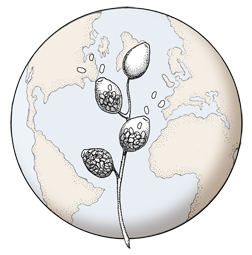Publication Type:
Journal ArticleSource:
Persoonia - Molecular Phylogeny and Evolution of Fungi, Volume 26, Number 1, p.13-39 (2011)URL:
http://www.ingentaconnect.com/content/nhn/pimj/2011/00000026/00000001/art00002Abstract:
During surveys of dying vegetation in natural ecosystems and associated waterways in Australia many new taxa have been identified from Phytophthora ITS Clade 6. For representative isolates, the region spanning the internal transcribed spacer region of the ribosomal DNA, the nuclear gene encoding heat shock protein 90 and the mitochondrial cox 1 gene were PCR amplified and sequenced. Based on phylogenetic analysis and morphological and physiological comparison, four species and one informally designated taxon have been described; Phytophthora gibbosa, P. gregata, P. litoralis, P. thermophila and P. taxon paludosa. Phytophthora gibbosa, P. gregata and P. taxon paludosa form a new cluster and share a common ancestor; they are homothallic and generally associated with dying vegetation in swampy or water-logged areas. Phytophthora thermophila and P. litoralis are sister species to each other and more distantly to P. gonapodyides. Both new species are common in waterways and cause scat tered mortality within native vegetation. They are self-sterile and appear well adapted for survival in an aquatic environment and inundated soils, filling the niche occupied by P. gonapodyides and P. taxon salixsoil in the northern hemisphere. Currently the origin of these new taxa, their pathogenicity and their role in natural ecosystems are unknown. Following the precautionary principle, they should be regarded as a potential threat to native ecosystems and managed to minimise their further spread.


